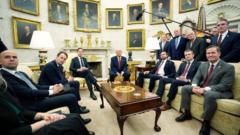A journalist's inadvertent inclusion in a military chat group reveals significant disagreements among top Trump administration officials about military actions against Yemen's Houthi group. The discussions underscore tensions surrounding U.S. foreign policy and defense costs related to European interests.
Military Chat Breach: Key Takeaways from Leaked Conversation on Yemen Strikes

Military Chat Breach: Key Takeaways from Leaked Conversation on Yemen Strikes
A recent security breach involving a military chat group sheds light on the inner workings and disagreements of the Trump administration regarding military actions in the Middle East.
A troubling security breach has recently come to light, centering on a messaging group containing high-ranking members of the Trump administration discussing military actions against the Iran-backed Houthi group in Yemen. The revelation came after Jeffrey Goldberg from The Atlantic was added to a Signal chat, reportedly including Defense Secretary Pete Hegseth, Vice President JD Vance, and National Security Adviser Mike Waltz. According to Goldberg, he witnessed classified military strike plans moments before execution.
Here are the primary insights derived from the leak:
1. **Divided Opinions on Military Strategy**: Vice President Vance expressed concerns over the planned strikes, suggesting they served European interests more than those of the United States. He questioned whether President Trump fully understood the implications of his military directives, indicating a potential disconnect.
2. **European NATO Relations**: The discussion revealed sentiments of resentment towards European allies, with Vance stating, “I just hate bailing Europe out again,” and the Defense Secretary echoing this sentiment. This highlights a growing frustration regarding perceived "free-loading" behavior from Europe concerning defense responsibilities.
3. **Expectations for Economic Return**: One group member, identified only as "SM," argued for the U.S. to demand economic compensation from Europe after conducting military operations. Their statement reflected a broader debate on the financial and political burdens of U.S. interventions.
4. **Aftermath and Emoji Reactions**: Following the execution of the strikes, various members expressed their support through emojis and messages of solidarity. Vance was noted to have said, "I will say a prayer for victory," signaling a blend of military strategy and personal belief systems among high officials.
5. **Message Control and Political Blame**: The discussion also showed attempts to manage public perception post-strike, with emphasis on blaming the Biden administration for its approach to Iran. Advisors voiced concerns over navigating the aftermath while assigning political accountability.
The leak not only highlights the discord within presidential advisors but also opens the door for increased scrutiny of U.S. military strategies and international relations, leading to calls for an inquiry into the secure protocols that were compromised. President Trump denied prior knowledge of the context surrounding the incident and has since expressed support for Waltz, despite defensive statements that "no secrets were revealed." As investigations unfold, the situation places further pressure on executive levels regarding national security protocols.






















